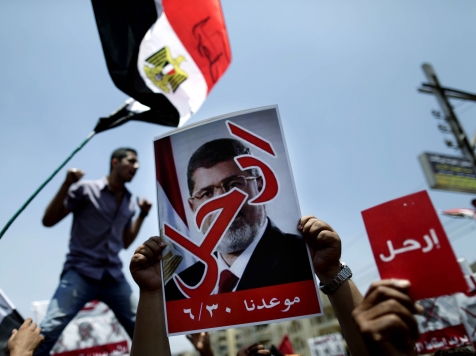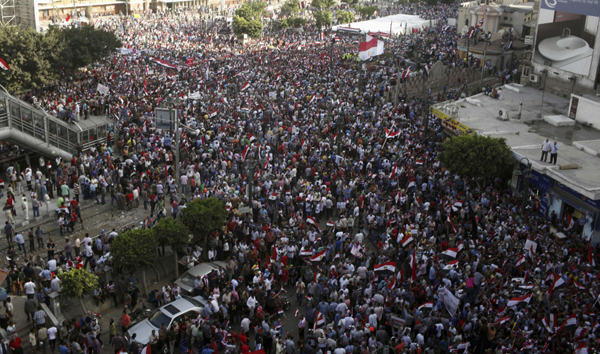
Egyptians staged mass protests nationwide on the first anniversary of Islamist President Mohamed Morsi’s inauguration yesterday, and the protesters have but one demand: that Morsi resign. Multiple media outlets are now reporting that the Egyptian military has issued an ultimatum to the country’s leaders: Meet the demands of the protesters within 48 hours or face a military imposed “road-map for the future.”
This is not only the biggest challenge to the rule by Morsi and his Muslim Brotherhood party, but the largest street protest in the entire history of the world. A 500,000-strong throng of protesters waved the Egyptian national flag while chanting “Get out!” They were massed in and around Cairo’s Tahrir Square.
“The people want the fall of the regime!” they shouted. This was the selfsame rallying cry of the Arab Spring that eventually toppled former President Hosni Mubarak. This time around, however, the protesters were not challenging an ageing dictator but Egypt’s first democratically elected leader in its 5,000-year recorded history.
The gigantic protest rallies occurred throughout the night, and were mainly peaceful, even festive.
Still, five people were shot dead in the Nile valley towns of Assiut and Beni Suef and the oasis town of Fayoum. The Egyptian Health Ministry reported that more than 200 were injured during conflicts with Morsi supporters in several provincial towns.
Reuters reports that a military source counted up to 14 million protesters. Other estimates are as high as 20 million protesters. Whether 14 million or 20 million, these people cannot be ignored. Egypt has a total population of 84 million. This means, of course, that in just this one protest, almost 20 percent of the entire populace took to the streets Sunday.
“Militants” among the protesters did throw Molotov cocktails and other homemade bombs and rocks at the Brotherhood’s headquarters in Cairo. Reports of shotguns firing were also noted. The front of the building actually caught fire, but there was neither a police nor fire protection presence anywhere to be found.

According to the Guardian, the “liberal” opposition party National Salvation Front declared victory in a “Revolutionary Communique No. 1″: The Egyptian masses, it said, had “confirmed the downfall of the regime of Mohamed Morsi and the Muslim Brotherhood.” Morsi’s official spokesman, Omar Amer, has stated that the president admits making mistakes but was in the process of addressing them. He also restated Morsi’s earlier offer of dialogue; but insisted that the president would not resign.
Protest leaders are urging the demonstrators to continuously occupy every central square in every city until Morsi steps down. In fact, they have blockaded Egypt’s house of parliament in Cairo.
As for the position of the army, the Tahrir masses were virtually overcome with joy when an army helicopter dropped Egyptian flags on the protesters – rather than strafed or bombed them. An army source told The Guardian that this was a gesture of “patriotism,” however, and not meant as a signal of support for the protesters.
However, according to CNN this afternoon, the army has thrown its considerable weight behind protesters. Indeed, the Egyptian military has issued an “ultimatum” to the country’s leadership just today: they have 48 hours to “meet the demands of the people” or it will restore order. The statement was broadcast nationwide on radio and television, and described by the military as “a final chance to shoulder the burden of a historic moment in our country.”
Protesters in Cairo’s Tahrir Square, cheered wildly as the statement was read. The masses of people were growing larger and larger and larger by the hour. Helicopters flew over them flying enormous Egyptian flags. The military claims that it seeks no direct role in the political affairs of the country.
Rather, the military appeared to be pressuring Morsi to restructure his government by reducing the influence of the Muslim Brotherhood in his cabinet and to call early presidential and parliamentary elections, a source close to highly placed members of Egypt’s leadership told CNN. Shortly after the announcement, Morsi met with Prime Minister Hisham Qandil and Egypt’s minister of defense and head of the country’s military, Gen. Abdel-Fatah El-Sisi, according to the president’s Facebook page.
The major complaint of the demonstrators is that the Brotherhood “hijacked” Egypt’s revolution against Mubarak and his regime, and then used universally recognized and accepted democratic processes to monopolize power — all with the ultimate objective of imposing Islamic law upon the country. This usurpation of political process and power was accomplished after both Morsi and the Muslim Brotherood had specifically promised and denied that Sharia Law would be imposed.
Still other demonstrators have turned against Morsi and the Brotherhood because of a deepening economic crisis and diminishing personal security. Morsi’s governing “style,” too, has produced a political deadlock in parliament, rendering him unable to effectively deal with any of these matters. Egypt has a robust secular, liberal and left-wing opposition, including former UN nuclear watchdog Mohamed ElBaradei and leftist presidential candidate Hamdeen Sabahi. Both men were present at the protest marches and demonstrations in Cairo.
Egypt’s second largest city, Alexandria, saw hundreds of thousands of protesters as well, as did at least 20 other cities, towns and villages. Morsi has denounced the protesters, but has not appeared in public within the last 48 hours. A senior Brotherhood politician, Essam El-Erian, condemned the protests as a “coup attempt.”
He challenged the opposition to wait for parliamentary elections instead of “simply massing people in violent demonstrations, thuggery or shedding the precious blood of Egyptians.” In an interview with Reuters, Egypt’s second largest Islamist party, Younis Makhyoun of the Salafist Nour party, urged Morsi to compromise with the crowds in order to avoid bloodshed and offered his services as a mediator between the two sides.
Interviewed by a British newspaper, Morsi again insisted that he would not resign. He characterized the protests as an undemocratic attack on his electoral legitimacy. However, he did extend yet another offer to revise the Islamist-inspired constitution. He said that the religious items in that document were never his idea, that he did agree with them, but had had no choice but to go along with the Brotherhood. It was just last week when Morsi made a similar offer. That offer was prompted by the head of the army who demanded that all politicians compromise. But the opposition leaders have dismissed both of Morsi’s overtures as too little and too late. They believe Morsi will have no choice but to resign in the face of the burgeoning numbers flooding the streets in every corner of the nation-state.
The post Millions Protest in Egypt – 2013 appeared first on YouFrisky.